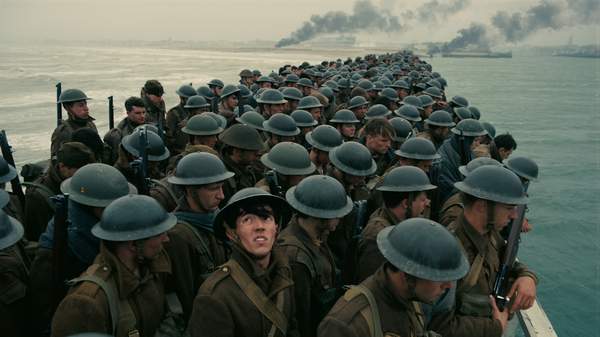Overview
Forget tats, magicians, superheroes and spinning tops. From Memento to The Prestige to his Batman trilogy, all have served director Christopher Nolan well. But in his latest film, nothing more than the sound and fury of war, and the anguish plastered across soldiers' faces, is needed to get his message across. If Inception famously gave audiences dreams within dreams, then Dunkirk delivers nightmares within nightmares — with the added tension of knowing that, for the first time in Nolan's career, the events seen on screen were inspired by reality.
And yet, there's a difference between bleak and dispiriting in Nolan's take on the mass military evacuation of northern France during the Second World War. It was code-named Operation Dynamo, but became better known as the Miracle of Dunkirk — and indeed, those two names serve as a rather handy guide to this movie's approach. Demonstrating a mastery of sound and vision, Dunkirk is devastatingly dynamic in its depiction of troops endeavoring to survive the carnage of combat, but remains a thoughtful portrait of human resilience and camaraderie as well. Real life proves soothing as well as scary, as Nolan balances tenacity with terror, fortitude with fear, and bravery with brutality.
For those in need of a history refresher, Dunkirk details the attempts to rescue more than 400,000 men stranded on the titular beach in May 1940. German forces had fenced them in by land, while planes attacked by air, often blowing away navy ships trying to take the British back to safety across the English channel. Nolan flits between the three perspectives, spending a week on the ground, a day in the ocean and an hour flying above. Young privates (played by the likes of Fionn Whitehead and Harry Styles) try to stay alive on the shore; a civilian boat captained by Dawson (Mark Rylance) and his son Peter (Tom Glynn-Carney) heads into the fray to help bring soldiers home; and two Spitfire pilots (Tom Hardy and Jack Lowden) patrol the skies to ward off further bombings.
As jam-packed as it may seem, the description above doesn't even scratch the surface of the film's complexities. Being told how Dunkirk's narrative explores the events in question is nothing compared to seeing and hearing Nolan's work in action. Shooting on IMAX and 65mm film, cinematographer Hoyte Van Hoytema makes the furrowed brows and piercing eyes of the movie's many men as much of a spectacle as swooping aircraft, capsized boats and lines upon lines of troops crowding the coastline. Favouring ticking clocks as much as droning instruments, composer Hans Zimmer unleashes a symphony of suspense that's as effective in its loudest moments as it is when it crashes into silence. This is chair-shaking, nerve-shredding, eye-popping cinema with a capital C.
At the same time, Nolan tempers his film's epic scale with moments of intimacy and introspection. While those two extremes sound mutually exclusive, simultaneously conveying both the broad scope and the personal impact of war is what makes Dunkirk so immersive, and so compelling. Unrelenting from start to finish, there's never a moment that's easy to watch, but there's never one devoid of hope either. This is an astonishing feat of storytelling, aesthetics and emotion, one from which you will not be able to look away.
Features
Information
When
Thursday, July 20, 2017 - Wednesday, September 27, 2017
Thursday, July 20 - Wednesday, September 27, 2017
Where
Various cinemas in MelbournePrice
$15 - 25-
Event Type
